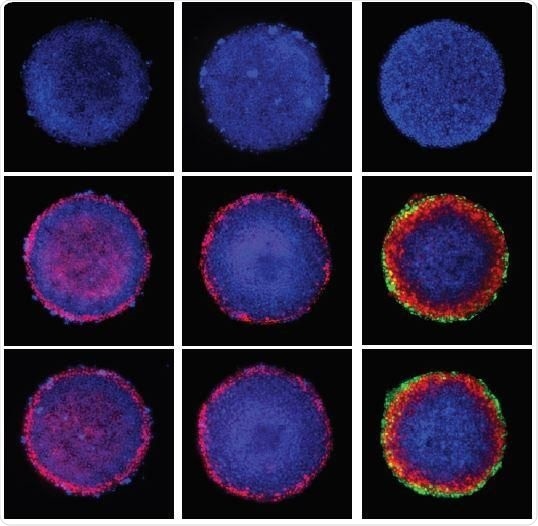Scientists at the Francis Crick Institute have identified the point when stem cells in human embryos irreversibly commit to specialization.

Image showing colonies of cells, showing differentiation in the first germ layers. Green is Cdx2 (trophoblast marker), Red is BRY (mesendoderm marker) and Blue is Sox2 (ectoderm marker). The top row were not exposed to the differentiation cue, the middle row were exposed for a short time and the bottom row were exposed for longer. The image shows that a short exposure to the differentiation cue is enough to make the same patterning as seen after full exposure. Image Credit: The Francis Crick Institute.
The biological history of humans can be traced back to a tiny group of cells known as embryonic stem cells that undergo cell division and result in the formation of cells that specialize in performing a certain role in the body—a process referred to as differentiation.
Interpreting the time and method of specialization of the embryonic stem cells can provide some understanding about the healthy differentiation of these cells and how they “remember” the type of cells they are.
But when cells “forget” their identity and convert into the wrong type, this process can go seriously wrong in cancer.
As part of the study, published in the Cell Stem Cell journal, the researchers discovered that embryonic stem cells differentiate early and rather unpredictably, irrevocably committing to becoming each of the more than 200 types of cells in the body.
The researchers demonstrated that this was caused by a recently discovered small group of genes that become stimulated, which they called “early-commitment genes.”
Working with stem cells and mathematical models, we’ve identified a new class of genes which are responsible for regulating one of the earliest stages of human development.”
Silvia Santos, Study Author and Group Leader, Quantitative Cell Biology Laboratory, The Francis Crick Institute
Silvia continued, “Once these genes are activated, it’s a question of minutes before the cells fully commit to differentiation. The speed of this is incredibly surprising, especially if you consider how the first signs of differentiation, that’s the embryo developing the first embryonic germ layers, take about three days. These layers ultimately give rise to all the tissues in the growing fetus weeks later.”
A special job for the GATA3 gene
A single early-commitment gene, known as GATA3, was targeted by scientists. When the gene was stimulated experimentally in the laboratory, the embryonic stem cells rapidly differentiated. However, upon deleting this gene, this process became slow and was not quite precise.
GATA3 is crucial to the healthy, timely differentiation of stem cells. Once it’s switched on, this gene triggers a positive feedback loop, which helps it stay active. In turn, this ensures that the cells remain differentiated, and do not reverse back to a stem cell state.”
Alexandra Gunne-Braden, Study Co-Lead Author and Postdoc, Quantitative Cell Biology Laboratory, The Francis Crick Institute
This study used stem cells that were extracted from embryos donated by people undergoing the IVF procedure. These donated embryos were not required in the course of these patients’ fertility treatment and would have been destroyed eventually.
When embryonic stem cells commit to specialisation is a fundamental and yet until now, unanswered question.”
Silvia Santos, Study Author and Group Leader, Quantitative Cell Biology Laboratory, The Francis Crick Institute
“It’s important we understand more about this, as the healthy function of cells is underpinned by the process of how cells acquire and remember their identity during the process of differentiation. This valuable insight into early human development could open up new avenues for research into diseases that occur when this process goes wrong,” Silvia concluded.
Source:
Journal reference:
Gunne-Braden, A., et al. (2020) GATA3 Mediates a Fast, Irreversible Commitment to BMP4-Driven Differentiation in Human Embryonic Stem Cells. Cell Stem Cell. doi.org/10.1016/j.stem.2020.03.005.